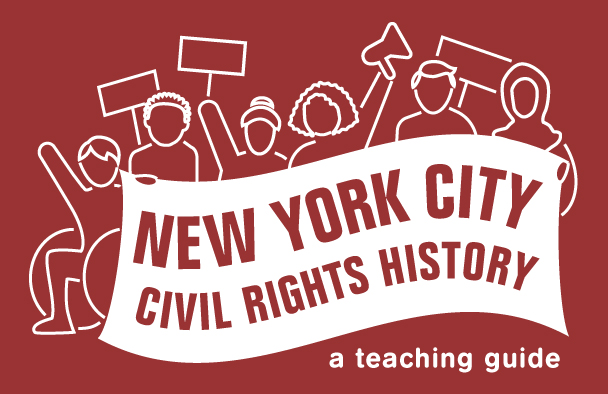You are here:
Hotel Pennsylvania Meeting Learns of Harlem School Ills

Date: Apr 17, 1937
Caption: This New York Amsterdam News reported on a Teacher Union event focused on racism and inequality in Harlem schools.

On April 16, 1937, Lucile Spence and the Teachers Union of New York organized a conference at the Hotel Pennsylvania in downtown Manhattan to discuss schools in Harlem.
The Teachers Union (TU) began in 1916 with 600 teachers. By the late 1930s, its membership totaled 6,500. In schools, the TU advocated for academic freedom, equal educational opportunities, and the truthful presentation of African American life and history. The organization also recognized the need for broader social change, and they championed radical social and economic reforms. Some members of the TU were members of the Communist Party, as were many leftist New Yorkers in the 1930s.1
Lucile Spence was a teacher of biology at Harlem’s Wadleigh High School and one of a small number of Black teachers in the city. She helped found the TU’s Harlem Committee, which sought to bring greater public attention to and increase resources for Harlem’s schools. The new committee spearheaded by Spence worked with local religious organizations and families. Spence wanted to work with the committee to improve students’ academic achievement, secure needed building repairs and construction, incorporate Black history into the curriculum, increase the hiring of Black teachers and administrators, and challenge the discriminatory attitudes and actions of school employees.2
Between 1935 and 1937, Spence’s work with the TU’s Harlem Committee brought greater attention to Harlem’s schools and helped build new organizations focused on improving educational opportunities for Black students in Harlem. For instance, in March 1936, a year after the “Harlem Riot" of 1935, the TU sponsored a meeting at St. Martin’s Church in Harlem. At that meeting, the Permanent Committee for Better Schools in Harlem (PCBSH) was established. Spence became its secretary.3
In January 1937, the PCBSH staged a mock trial, which they called a “People’s Trial,” of the New York City Board of Education. The charges were discrimination and neglect of school children in Harlem. A jury, composed of prominent community members, found the Board of Education guilty on all charges and urged Mayor Fiorello LaGuardia to reconvene his Commission on the Harlem Riot to investigate school conditions in Harlem.4
Three months later, Lucile Spence and the TU organized the Hotel Pennsylvania conference described in the Amsterdam News article here.
-
Clarence Taylor, “Harlem Schools and the New York City Teachers Union,” in Educating Harlem: A Century of Schooling and Resistance in a Black Community, ed. Ansley T. Erickson and Ernest Morrell (New York: Columbia University Press, 2019), 138-158, https://harlemeducationhistory.library.columbia.edu/book/chapters/06/. ↩︎
-
Lauri Johnson, “A Generation of Women Activists: African American Female Educators in Harlem, 1930-1950,” The Journal of African American History 89, no. 3 (July 2004): 223–40, https://doi.org/10.2307/4134076; Jonna Perrillo, Uncivil Rights: Teachers, Unions, and Race in the Battle for School Equity (Chicago: University of Chicago Press, 2012). ↩︎
-
Johnson, “A Generation of Women Activists”; Perrillo, Uncivil Rights; Taylor, “Harlem Schools and the New York City Teachers Union.” ↩︎
-
Taylor, “Harlem Schools and the New York City Teachers Union.” ↩︎
Categories: Manhattan, K-12 organizing, teacher activism
Tags: teachers unions, school facilities, racist segregation, Harlem, Black people, communism, multiracial organizing
This item is part of "Lucile Spence and Teacher Activism" in "Black and Latina Women’s Educational Activism"
Item Details
Date: Apr 17, 1937
Source: New York Amsterdam News
Copyright: Under copyright. Used with permission.
How to cite: “Hotel Pennsylvania Meeting Learns of Harlem School Ills,” in New York City Civil Rights History Project, Accessed: [Month Day, Year], https://nyccivilrightshistory.org/gallery/hotel-penn-meeting.
Questions to Consider
- What did Lucile Spence mean when she said “The result of the continued neglect of this group in the heart of New York presents a challenging situation for the educator who sees the fruits of such neglect?” What other comments by Spence or others in the article stand out to you?
- How did Lucile Spence’s work as a teacher influence her activism?
- Which of the conditions that the TU was protesting still exist in NYC schools today?
References
How to Print this Page
- Press Ctrl + P or Cmd + P to open the print dialogue window.
- Under settings, choose "display headers and footers" if you want to print page numbers and the web address.
- Embedded PDF files will not print as part of the page. For best printing results, download the PDF and print from Adobe Reader or Preview.
